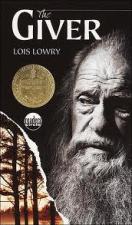|
|
LITR 5439 Literary & Historical Utopias
The Giver (1993) young adult utopian novel by Lois Lowry (b. 1937) |
|
The Giver, published in 1993, won that year's Newbery Award, the most prestigious prize for children's literature.
Sequels: Gathering Blue (2000); Messenger (2004)
Reading selections (photocopy handout):
novel title page
pp. 4-7 depicting opening family scene: how utopian?
pp. 121-27 utopian dialogue, revelation of dystopia, conflict with utopian family
Overview of novel
Jonas lives with his gentle, supportive family in a carefully controlled community where every year of maturation is commemorated with new uniforms and responsibilities. At 12 each child is assigned (by the community's Elders) an occupation for life. Rather than a traditional occupation, Jonas is assigned the role of Receiver, who keeps memories from earlier times of colors, flavors, difference, feelings, loneliness, war, hunger, need, love.
Most impressive literary quality: The systematic nurture and comfort of Jonas's family makes the novel's world feel impressively utopian, but as the story progresses, standard dystopic conventions emerge: repression of difference and individuality, desensitization, conformity.
Young Adult features:
Novel opens inside a familiar family scene.
As their future remains open and unformed, adolescents may be particularly resistant to the complexity, specialization, and narrowing of adult life.
Sense of betrayal by adult authorities
Protagonist as "chosen one" (cf. Star Wars, The Matrix, virtually any sf romance); heroic individualism as standard appeal
Sentimentality--babies are sweet, need to be defended
Other genre considerations:
Romance as rescue, trials
Discussion Questions:
In both passages, what standard utopian conventions in genre and content?
How also identify as Young Adult genre?
pp. 4-7 How does the family appear utopian?
pp 121- How is dystopia revealed?
(contrast with golden age, natural family)
Utopian conventions:
dialogue, elder-younger (or experienced-initiate)
learning
social control and direction
experimentation with family

